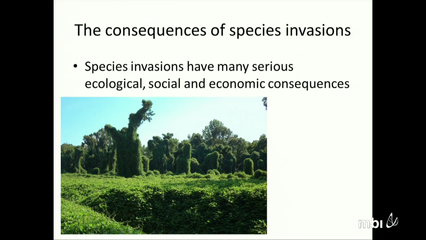MBI Videos
Emily Jones
-
 Emily JonesSpecies exist in complex biotic environments, engaging in a variety of antagonistic and cooperative interactions that contribute to their population and evolutionary dynamics. However, studies tend to concentrate on each pairwise interaction in isolation. By doing so, they may overlook significant feedbacks between the interactions. In this talk, I will focus on plant-pollinator mutualisms, which are often beset by species that reduce the benefits of the mutualism by exploiting the plant, the pollinator, or both. Through a combination of theoretical and empirical results, I will demonstrate how predictions about the ecological stability of mutualisms and the level of cooperation between mutualistic partners are changed by consideration of exploiters such as non-pollinating seed predators and predators of pollinators.
Emily JonesSpecies exist in complex biotic environments, engaging in a variety of antagonistic and cooperative interactions that contribute to their population and evolutionary dynamics. However, studies tend to concentrate on each pairwise interaction in isolation. By doing so, they may overlook significant feedbacks between the interactions. In this talk, I will focus on plant-pollinator mutualisms, which are often beset by species that reduce the benefits of the mutualism by exploiting the plant, the pollinator, or both. Through a combination of theoretical and empirical results, I will demonstrate how predictions about the ecological stability of mutualisms and the level of cooperation between mutualistic partners are changed by consideration of exploiters such as non-pollinating seed predators and predators of pollinators. -
 Emily Jones
Emily JonesWhen a species is introduced into a novel habitat, it faces a set of selection pressures that may differ considerably from those in its native range. Simultaneously, the arrival of a new species is likely to perturb the resident community and to change the selection pressures acting on resident species. These novel, and potentially strong, selection pressures set the stage for rapid evolution (and coevolution) of the introduced and the resident species. Does rapid evolution following a species introduction increase the chances of successful establishment by the non-native species, or does rapid evolution increase the resident community?s resistance to invasion? I address this question with population genetic models that link the ecological and evolutionary dynamics, allowing for eco-evolutionary feedbacks. As I describe the model results, I will highlight lessons for conservation and priorities for future research.
